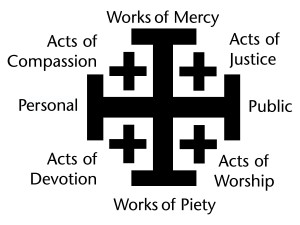Last week I talked about kinds of grace. This week I want to cover the means of grace: how we experience the great, generous love of God after we have walked through the door of the mansion of grace. John Wesley, in Sermon 16, preached that the means of grace are the “ordinary channels” by which God’s grace is conveyed to each of us. In other words, we experience God’s grace when we participate in these things.

There are two general categories of means of grace: works of piety and works of mercy. Each of these categories is broken down into two expressions: individual and communal. So there are four areas where we can participate in and experience God’s grace.
First, there are individual works of piety. These are the activities that preachers love to expound on because few people can argue with them. They are the personal basics of a life of faith: reading the Bible, meditation, prayer, and fasting. These things are done individually to give us a more personal experience of God’s grace. They help us to be pious, a word which has developed bad connotations because so many Christians who practice individual acts of piety become self-righteous and hypocritical. But pious is a good thing when we do it like Jesus did – with humility and knowing that we are the “the least of these.”
 Next are the communal acts of piety: things that we do with others to bring us closer to God. Worship, participating in the sacraments (baptism and communion), Bible Study, and being accountable to one another. We might agree with the first three – those are relatively easy – but we have a harder time with the last one. We have a hard time being honest with ourselves about our Christian lives, much less sharing it with others. And, if we are on the other side of it, we might wonder who are we to judge the life of others? So we need to develop the kind of close Christian relationships that allow us to be honest with each other. The best Sunday School classes and Bible Study groups are these kinds of places. Everyone needs friends who will hold us accountable, tell us when we are full of it, and push us to be our best selves.
Next are the communal acts of piety: things that we do with others to bring us closer to God. Worship, participating in the sacraments (baptism and communion), Bible Study, and being accountable to one another. We might agree with the first three – those are relatively easy – but we have a harder time with the last one. We have a hard time being honest with ourselves about our Christian lives, much less sharing it with others. And, if we are on the other side of it, we might wonder who are we to judge the life of others? So we need to develop the kind of close Christian relationships that allow us to be honest with each other. The best Sunday School classes and Bible Study groups are these kinds of places. Everyone needs friends who will hold us accountable, tell us when we are full of it, and push us to be our best selves.
The third combination is individual acts of mercy. These are the good things that we choose to do for others as individuals. We might visit the sick or those in prison. We might work in a soup kitchen, give money to a good cause, build a Habitat for Humanity house, or tutor children. We become the hands of Jesus in touching the hurting places of others and helping them out.
 The final area is the communal acts of mercy. This is the one that I have the hardest time with because it is hard to know how I can really make a difference in issues that seem so big when I am so small. Communal mercy is seeking justice, ending oppression and discrimination, and working to end the causes of poverty in the world. I can do individual acts of mercy all day long. But where do I even begin with these global issues? We begin by getting together with others to address something that we feel is wrong. Most of the big changes in the world have come because one individual talked to another individual until many people were talking and then doing something about it.
The final area is the communal acts of mercy. This is the one that I have the hardest time with because it is hard to know how I can really make a difference in issues that seem so big when I am so small. Communal mercy is seeking justice, ending oppression and discrimination, and working to end the causes of poverty in the world. I can do individual acts of mercy all day long. But where do I even begin with these global issues? We begin by getting together with others to address something that we feel is wrong. Most of the big changes in the world have come because one individual talked to another individual until many people were talking and then doing something about it.
All of these means of grace are important in our development as Christians. If we lean too hard on the individual practices we become separated from others and irrelevant to the world. If we focus on piety at the expense of mercy we become hypocritical and judgmental. If we give our lives mercy and forget about piety, we forget our foundation and can wander away from God’s will in a situation.
Which means of grace is most important to you? Which one challenges you the most? How have you grown in God’s grace as you have participated in one of these means of grace?
